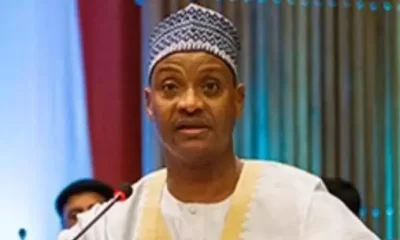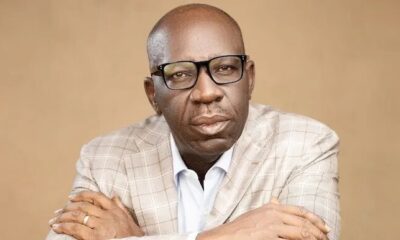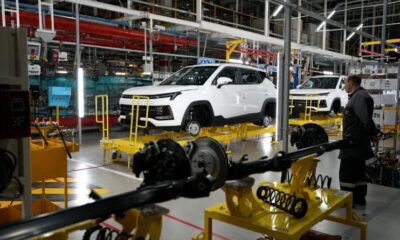Economic Issues
Trade Equity: Avoiding the Pitfalls of Exploitation -By Femi Amosun
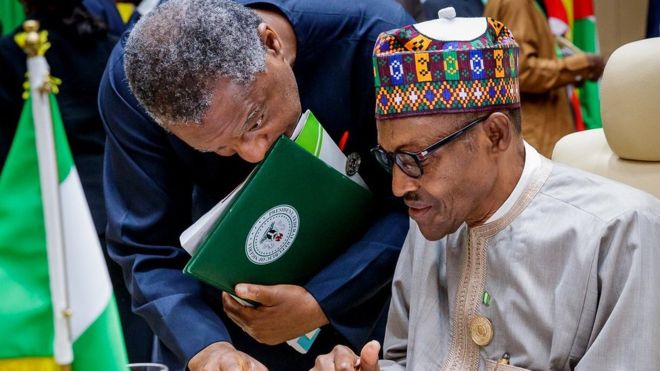
Before many Nigerians and the Public officials stumble on the euphoria of the recent historical Visits by some Western leaders namely; Emmanuel Macron, President of the French Republic, Theresa May, Prime Minister of United Kingdom of Great Britain and Northern Ireland, and influential Angela Merkel, the Chancellor (Frau Bundeskanzlerin) of the Federal Republic of Germany, we need to take a step back and think about the long-tern implications of their visit to our country and the African Continent at large.
Let me quickly elucidate that in line with conventional practice, prior to their respective Visits, the foreign country’s Consultants and Govt. officials would have carried out preliminary study to clearly understand the prevailing environment. The vital tool of In-depth analysis would have provided them with deep insight into the Nigerian industry sectors. Furthermore, the various analyses would have identified our Government actions, tax levels, privatization policy, income levels, employment levels, inflation rate, and economic growth rate. The demographics, technological gap, market potential, market information, strategies in the areas of technology, manufacturing/production, marketing, logistics, and human resources information would have gathered and analyzed. Intelligence about national attitude towards foreign firms, national government regulations, raw materials, macroeconomic trends, social structure, political climate and risk, and specific industry information would have formed part of the remit. All the aforementioned analyses and information may have indicated that, despite the political shenanigans and Party rancour, Nigeria offers huge opportunities for foreign investment with utmost dividends.
The drawback for Nigeria is that our Civil servants and Political office holders may not possess the relevant technical expertise and skillsets required for such in-depth analysis and comprehensive understanding of Trade negotiation and policy. Here the expertise of Consultants and other Professionals will bring into play more informed perspectives and analysis which could inject fresh insight and ideas into our Government understanding of mutual trade negotiation. The result is better decision-making, allowing us to seize new opportunities and avoid potential pitfalls. It is, therefore, evident that the Visits were not a twist of fate but a carefully planned intervention.
China’s, through the Strategic Partnership initiatives, intervention in the Nigeria’s vital infrastructural projects in the railway, power, education, ICT, trade, agriculture, construction sectors is also a carefully planned strategy to expand their global reach and domination. Prime Minister Theresa May of the United Kingdom of Great Britain and Northern Ireland (the grand master of diplomacy) on the other hand pledged the UK’s support in the areas of security, asset recovery, trade and fight against corruption. Equally important, the Prime Minister also agreed a £10.5m package (counselling, re-integration to their communities etc) to help victims of modern slavery. During the visit of Chancellor Angela Merkel to Nigeria, a MoU was signed between Volkswagen and Nigeria to develop an automotive hub in Nigeria.
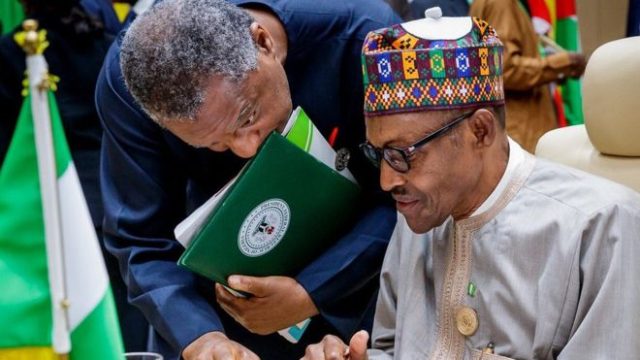
In my teen years in the mid 70s, my father had two Volkswagen (widely known as Beetle) cars which we used for going to Church on Sundays and other important occasions like returning to the Boarding house after school holidays. I can’t quite call to mind what happened to Volkswagen Company in Nigeria.
Interestingly, my MBA Degree Thesis was based on Nigeria’s Foreign Trade Policy and the developmental effects in the Nigerian Oil and Gas sector. The thesis provided a solid testing ground in which to test, analyze and assess the compatibility of Nigeria’s foreign trade policy in relation to the evolving global oil market.
The International Context
The global economic world is becoming unstable and unpredictable mainly due to the afterthought negative impacts of Brexit (UK exiting European Union, with the possibility of No Deal impact); disruption of historical trade agreements and tariffs protracted by President Donald J. Trump of the United States of America; the NAFTA agreement which is at the verge of been dismantled; the shocking level of migration into Europe and the perceived impact on local infrastructures and facilities etcetera. Prior to this global disruption, international relations have been characterized by trading arrangements, namely:
- The NAFTA (North America Free Trade Agreement), the Single European Market (1992), ASEAN (Association of South East Asian Nations), ECOWAS (Economic Community of West African States), AU (African Union), OPEC (Organization of the Petroleum Exporting Countries) are all formed to foster trade and economic relationships and remove or reduce barriers between markets within the regions, leading to market growth.
- The GATT Uruguay agreement, which is an evolution of trade liberalization. Under the agreement, a new World Trade Organization (WTO) succeeded the GATT body. The WTO provides more rapid settlement of trade disputes and acts as a global trade policeman.
- The formation of customs unions and trading blocs, for example, EU, NAFTA, ECOWAS.
- Agreements on the sharing of the proceeds from exploitation of such natural resources, for instance OPEC.
However, the various economic indicators would suggest that, the world is going through a process of phenomenal development particularly in technology, commerce and political evolution. This may have propelled the development and formulation of new strategic trade policy in the Western countries. Trade policy or commercial policy is a form of Government policy that influences international trade through taxes or subsidies or through direct restrictions on imports and exports. The principal tools of foreign trade policy are tariffs, quotas, exchange control and invisible tariff. Foreign trade policy is usually designed to provide greater national benefit and improve aggregate economic well-being of a nation. Ceteris paribus (all things being equal), mutual trade relations, market intelligence, competitiveness and globalization now form the nature of new emerging Strategic trade policy, which requires new skill set, much broader and more integrated perspective of foreign trade. Matching foreign trade policy and international strategy is about striking the balance between national economic system, culture, expectations, shifting market conditions, and rapidly changing international trade environment. The end-product is then transferred to the international marketplace by means of trade policy to exploit trade opportunities, economic gains, inward investment, and achieve a better economic well-being of the nation as a whole.
In order to derive full benefits of the aftermath of these Western leaders’ Visits, we must reshape our national thinking, ways of doing things, and address critical areas of national development.
National strategy
Fitting Nigeria into this new developmental portfolio is an upheaval task simply because even at the most elementary level our Country is lagging behind. How do we create economic freedom and social development in Nigeria? How do we plan to take advantage of the “New rush” to Africa? How can we anticipate changes and make them work for us? What are some of the feasible solutions that could assist us in achieving long-term economic development and prosperity? Let’s attempt to address some of these questions from a broader perspective.
At the time of our independence in 1960, the whole country was prepared for the great future in terms of political development, economic miracles and social fabrics that will give every Nigerian citizen a well-deserved pride, dignity, patriotism and to be part of a nation aspiring towards greatness. The intervention of the military in this process of evolution announced the beginning of backwardness. The twenty-nine years of military dictatorship played major part in this process of disintegration that systematically scaled down the economic and social fabrics of our nation. Today, we’re witnessing the steady increase in poverty, social decay, backwardness and manifestation of other social evils.
Given the central importance of the role of international trade within the wider economy, the Nigerian industry sector could be well positioned to play a key role in our national economic development. As l have explicitly enunciated in another piece of work titled”Exportation of Nigerian yam: Adopting analytical approach”. The trade environment in Europe, USA and Asia is not static. Innovation, well-enlightened population, corporate dynamism, technological advancement, political structure and decisions, economic policies, environmental considerations and cultural fit are all the main driving forces. In this modern age of globalization and Internet revolution, our natural resources should not; and must not; be controlled and manipulated by foreign-owned companies. This is not a call for protectionism policy but rather a way to begin to organize our affairs to improve the lives of our citizens. The free market policy orientation and fair competition in the conduct of international trade needs to be managed and consistent with our national interests. In effect, this should mean a change in the overall governmental attitude towards foreign trade principles.
Our policymakers need to strike a balance between national requirements and interests and international scope for economic gains. It is now evident that our energy/electricity industry and other major industries are largely controlled by foreign-owned companies. And you wonder why Nigeria is far behind other developing nations, it is simply because of the unprecedented number of foreign investors allowed by our successive governments to control our vital industries.
The Federal Government should encourage local investors and move away from the past government rigid approach of attracting foreign investors, who by definition, may not genuinely have the interest of Nigeria at heart. Investors only invest where they can make more money. The South Africa-owned Companies operating in Nigeria are classic example of how foreign companies can exploit the local market and consumers to its home country beneficial agenda.
It would be difficult, if not impossible, to take full advantage of the “Strategic Partnership” or “Comprehensive Partnership” without stable electricity, water supply, good roads, sound educational system, sustainable healthcare system, security and safety, socio-economic facilities, and other essential amenities designed for good life. Putting proper structures in place, including sound and efficiently-managed public organization, is not only the best way to avoid trade exploitation but also the logical way to speed up our national development.
It is, therefore, the contention of this paper that, the pressure of a rapidly evolving trade environment will lead to the need for a more `strategic` and cohesive approach both in the formulation and implementation of credible trade policy to transform our national capability. Our government needs to initiate a strategy of nation building through constructive and mutual partnerships; otherwise the whole essence of our Public officials globetrotting would be meaningless. To access the full Paper double click on Trade Equity Avoiding the pitfalls of Exploitation
It’s been a privilege to make this contribution from the UK.
Femi Amosun is an acclaimed Business Adviser and founder of NIFOM Consulting (UK), an independent business consultancy helping aspiring business owners, SMEs and Public sector organizations to develop key technical skills and grow their business. femi.amosun@nifom.co.uk



